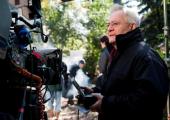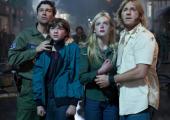Tony Scott 1944-2012

Remembering the British director whose films thrilled millions but never won an Oscar
Anthony David “Tony” Scott was "the other Scott brother" whose filmmaking was cinematic, determined and all-encompassing. After directing thousands of television commercials, Scott’s breakthrough film, The Hunger, starring Catherine Deneuve, Susan Sarandon and David Bowie, became a classic, setting the stage for beautiful, elegiac and shocking tales of vampirism, love, and the implications of immortality. A trained fine artist, Scott's eye always found the perfect shot.
Interview: 10 Questions for Bobcat Goldthwait

The US comic-turned-director on the awful truth behind his latest satire, God Bless America
Tracing a career arc which has taken him from stand-up comic to actor, writer and film director, it's not too fanciful to describe Bobcat Goldthwait as an anarchic, indie, low budget version of Woody Allen. The 50-year-old New Yorker started out in the clubs of Boston before heading west to Hollywood in the 1980s, where he cultivated a shrill-voiced, nervy, confrontational comic persona to considerable success.
Interview: Whit Stillman, Metropolitan Filmmaker

The director explains why his new film Damsels in Distress has been so long in the pipeline
Unlike the New Seekers, Whit Stillman does not want to teach the world to sing. He does, however, want to teach it to dance, specifically to dance the Sambola (or, to give it its full name, Sambola! The New International Dance Craze). Instructions and a demonstration accompany the final credits of his new film, Damsels in Distress.
Tamara Rojo, prima ballerina, becomes English National Ballet's director

Royal Ballet star in her peak takes on management of UK ballet's hot potato
Royal Ballet prima ballerina Tamara Rojo has been appointed the new artistic director of English National Ballet. Though the announcement was officially dated for tomorrow, the press release was issued by the company this morning and the news has been widely sent out over the internet and social media since then.
theartsdesk Q&A: Film-maker Andrew Kötting

A maker of indelible images memorialises his family's escapes to rural isolation
Fifteen years after I first saw Andrew Kötting’s Gallivant (1996), I’m still haunted by its depiction of the pilgrimage Kötting made around the coast of Britain with his 85-year-old grandmother Gladys and his seven-year-old daughter Eden (pictured together below right). Lyrical but not sentimentally scenic, it paid homage to folk customs that contain the spirit of ancient communal life while pointedly spurning the commercial culture that characterises resort towns.
Interview: Director Peter Gill

Half a century after leaving Cardiff, the director returns to A Provincial Life with National Theatre Wales
There is a simple explanation to why Cardiff-born Peter Gill has never directed in his home city, despite the fact that many of his own plays are set in the Catholic, working-class Cardiff of his youth. “I’d never been asked,” states Gill matter-of-factly; “it’s just a trade; it’s not a magical world. You have to ask me to do things.”
The Lion King's West End Reign

The hit Disney musical celebrates 5,000 performances
The stage musical The Lion King has been seen by nearly 10 million people in the UK - almost 60 million worldwide – and Lord only knows how many must have seen Walt Disney’s animation. I have a friend who reckons he has seen it at least 26 times and a female acquaintance who firmly believes that curling up in front of the DVD is the cure-all for heartache – well, we can’t all write songs like Adele - but until recently, The Lion King had completely passed me by. I couldn’t even have hummed so much as a crotchet and a quaver of Elton John and Tim Rice's Oscar-winning song “Can You Feel the Love Tonight?"
theartsdesk Q&A: Director István Szabó

As his earliest success is released on DVD, the great Hungarian director looks back
When I interviewed the great Hungarian film-maker István Szabó (b 1938) in his native Budapest, he took me on a tour of the city centre on the Pest side of the Danube. On the way we were distracted by a flashy café designed to lure tourists. It was called Mephisto – after the film by Szabó, presumably, which won the Oscar for Best Foreign Film in 1981. “I don’t know if it’s named after the film," he said, "but I think it must be because they have used the same typeface.” Then he added, “I’ve never been in there.”
Super 8

Mystery, magic, movies and vintage pop songs in JJ Abrams's Spielbergian adventure
Having masterminded the existential fantasy of Lost, reinvented Star Trek and served up the monster-on-the-loose rampage of Cloverfield, JJ Abrams now comes trampling all over Steven Spielberg's favourite turf of a homely, nostalgic America. He can feel Spielberg's benign hand resting on his shoulder though, since the Big 'Berg co-produced and brought aboard several of his favourite sound and visual effects specialists.


